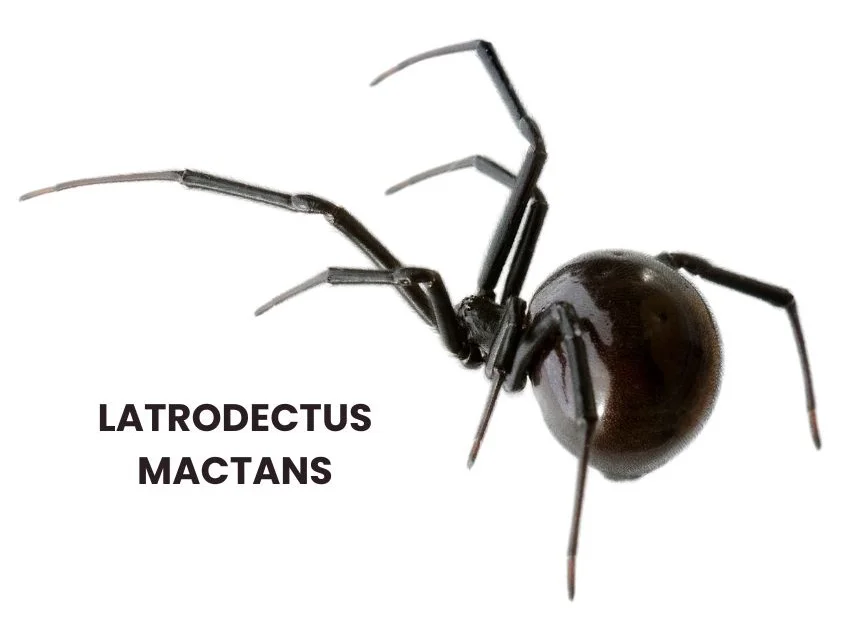Latrodectus mactans, commonly known as the Black Widow Spider, is infamous for its venomous bite, which produces significant neurological and muscular symptoms.
In homeopathy, this remedy is primarily used for conditions resembling the effects of the spider’s bite, particularly focusing on symptoms related to angina pectoris and severe musculoskeletal pain.

Table of Contents
ToggleSOURCE INFORMATION
- Common Name: Black Widow Spider
- Scientific Name: Latrodectus mactans
- Family: Theridiidae
Scientific Classification
- Kingdom: Animalia
- Phylum: Arthropoda
- Class: Arachnida
- Order: Araneae
- Family: Theridiidae
- Genus: Latrodectus
- Species: L. mactans
Origin
- The Black Widow Spider is native to various regions, including North America.
- It is known for its potent venom, which can cause severe pain and systemic symptoms in humans.
Historical Facts
- The use of Latrodectus mactans in homeopathy is derived from the toxicological effects observed after a spider bite.
- The remedy is prepared by potentizing the venom of the Black Widow Spider to render it safe for homeopathic use.
DRUG PATHOGENESIS
- Latrodectus mactans acts primarily on the nervous and cardiovascular systems, producing a clinical picture similar to angina pectoris.
- It is also indicated for severe muscular pain and neurological symptoms resulting from the venom’s effects.
KEY CHARACTERISTICS
- Angina Pectoris Symptoms: Severe chest pain radiating to the shoulders, back, and arms.
- Muscular and Neurological Symptoms: Intense pain, muscle cramps, and numbness.
- Respiratory Distress: Difficulty breathing and fear of losing breath.
DETAILED ORGAN SYMPTOMS
HEAD
- Anxiety and Screaming Pain: The patient may experience severe anxiety and pain that radiates from the neck to the back of the head, particularly in the occipital region.
RESPIRATORY
- Extreme Apnea and Gasping: The patient may struggle with breathing, gasping for air, and feeling a sense of suffocation.
- Fear of Losing Breath: There is a profound fear of not being able to breathe, which can exacerbate anxiety.
CHEST
- Violent Precordial Pain: Intense pain in the chest, extending to the axilla (armpit) and down the arm to the fingers, often accompanied by numbness.
- Feeble and Rapid Pulse: The pulse may become weak and fast, indicating cardiovascular distress.
- Sinking Sensation: A feeling of sinking or collapsing in the chest area, which can be alarming to the patient.
EXTREMITIES
- Pain and Paralysis in Left Arm: The left arm may feel paralyzed and weak, with pain radiating from the chest.
- Cramps in Abdominal Muscles: Weakness in the legs can be followed by severe cramps in the abdominal region.
- Paraesthesia: Abnormal sensations such as tingling or numbness in the lower limbs.
SKIN
- Coldness of the Surface: The skin may feel extremely cold, almost like marble, indicating poor circulation.
RELATIONSHIP WITH OTHER DRUGS
Latrodectus mactans has several related remedies, especially within the group of spider remedies, which share some similarities and have unique indications. Here are the key comparisons:
LATRODECTUS HASSELTI
- Also known as the Australian Redback Spider, this remedy is noted for its long-lasting effects, particularly in cases of intense pain associated with pyaemia (pus-forming bacterial infections), paralysis, and septicaemic conditions (blood poisoning).
- It is especially useful where there is significant systemic infection leading to severe symptoms.
ARAENA
- This remedy, derived from another species of spider, is used for a different set of symptoms.
- It is typically indicated for ailments where there is a marked impact on the nervous system, though the specific indications can vary widely depending on the species.
MYGALE AND THERIDION
- These spider remedies each have their unique therapeutic uses.
- Mygale is often indicated for conditions involving convulsions and chorea (involuntary, rapid, jerky movements), while Theridion is used for cases where there is extreme sensitivity to noise and vibration, often with associated vertigo and nervousness.
LATRODECTUS KALIPO
- Known as the New Zealand Katipo Spider, this remedy is recognized for its effectiveness in treating lymphangitis (inflammation of the lymphatic vessels), nervous twitchings, and a distinct burning eruption.
- The symptoms often include significant localized inflammation and systemic nervous reactions.
TRIATEMA (KISSING BUG)
- This remedy, derived from an insect known for causing Chagas disease, is used for its ability to address symptoms such as swelling, violent itching, a smothering sensation, and rapid pulse.
- The insect’s bite can cause significant localized and systemic reactions, making this remedy particularly useful in such cases.
DOSE
- Potency: Sixth potency is commonly used.
Frequently Asked Questions
What conditions is Latrodectus mactans used for?
- It is primarily used for symptoms resembling angina pectoris, severe musculoskeletal pain, and neurological symptoms.
How does Latrodectus mactans help with angina pectoris?
- It alleviates intense chest pain radiating to the shoulders, back, and arms, similar to the pain experienced during angina.
What are the side effects of Latrodectus mactans?
- Homeopathic remedies are generally considered safe, but it is always best to use them under the guidance of a qualified homeopathic practitioner.
Can Latrodectus mactans be used for respiratory distress?
- Yes, it helps manage severe respiratory distress, including apnea and gasping for breath.
What potency of Latrodectus mactans is most effective?
- The sixth potency is commonly used, depending on the severity and nature of the symptoms.
Glossary of Difficult Words
- Angina Pectoris: Severe chest pain due to reduced blood flow to the heart.
- Apnoea: Temporary cessation of breathing.
- Precordial: Relating to the region in front of the heart.
- Paraesthesia: Abnormal sensations such as tingling or numbness.
- Pyaemia: Blood poisoning caused by pus-forming bacteria.
By understanding the detailed properties and uses of Latrodectus mactans, practitioners can better utilize this remedy for treating severe pain, respiratory distress, and cardiovascular symptoms, ensuring effective and safe patient care.
